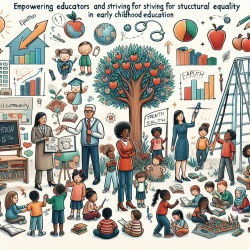In the realm of early childhood education, the impact of comprehensive programs extends far beyond the classroom. Recent research underscores the profound influence these programs have on community support structures and long-term health outcomes. The study titled "Structural Equality and Support Index in Early Childhood Education" offers invaluable insights into how educators can leverage these findings to enhance their practice and foster more equitable communities.
The Power of Early Childhood Programs
The research conducted by Morency et al. (2024) highlights that participation in high-quality early childhood programs (ECPs) is associated with improved social determinants of health (SDH) in adulthood. This study followed individuals who attended the Child-Parent Center (CPC) preschool program from early childhood into midlife, revealing that such programs significantly contribute to structural equality and community support.
Key findings indicate that individuals who participated in CPC programs scored higher on the Index of Structural Equality and Support (I-SES), a measure based on the Healthy People 2030 framework. This index evaluates neighborhood-level assessments, quality of education and health services, and experiences of racial discrimination in social contexts.
Implementing Research Outcomes in Practice
For practitioners in early childhood education, these findings offer a roadmap for enhancing educational practices:
- Focus on Quality: Ensure that early childhood programs are comprehensive and high-quality. This includes small class sizes, enriched learning environments, and robust family engagement initiatives.
- Community Engagement: Foster strong connections between schools and communities. Encourage parental involvement and create opportunities for community members to engage with educational activities.
- Address Socioeconomic Barriers: Advocate for resources that mitigate the impacts of poverty on education. This may include providing access to health services, nutritional support, and safe housing options.
- Cultural Competency: Develop programs that are sensitive to the cultural and social contexts of students. Address issues of racial discrimination and promote inclusivity within educational settings.
The Broader Impact
The implications of this research extend beyond individual educational success. By investing in high-quality ECPs, educators can contribute to healthier communities where structural equality is prioritized. Educational attainment serves as a key mechanism for promoting supportive social environments, reducing health disparities, and fostering economic stability.
This study reinforces the importance of adopting a holistic approach to early childhood education—one that integrates educational success with broader community support systems. As educators, embracing these principles can lead to transformative outcomes for both students and society at large.
Encouraging Further Research
The journey towards creating equitable educational environments is ongoing. Practitioners are encouraged to delve deeper into the research presented in this study to further refine their approaches and explore innovative strategies for enhancing structural equality within their communities.
To read the original research paper titled "Structural Equality and Support Index in Early Childhood Education", please follow this link.










